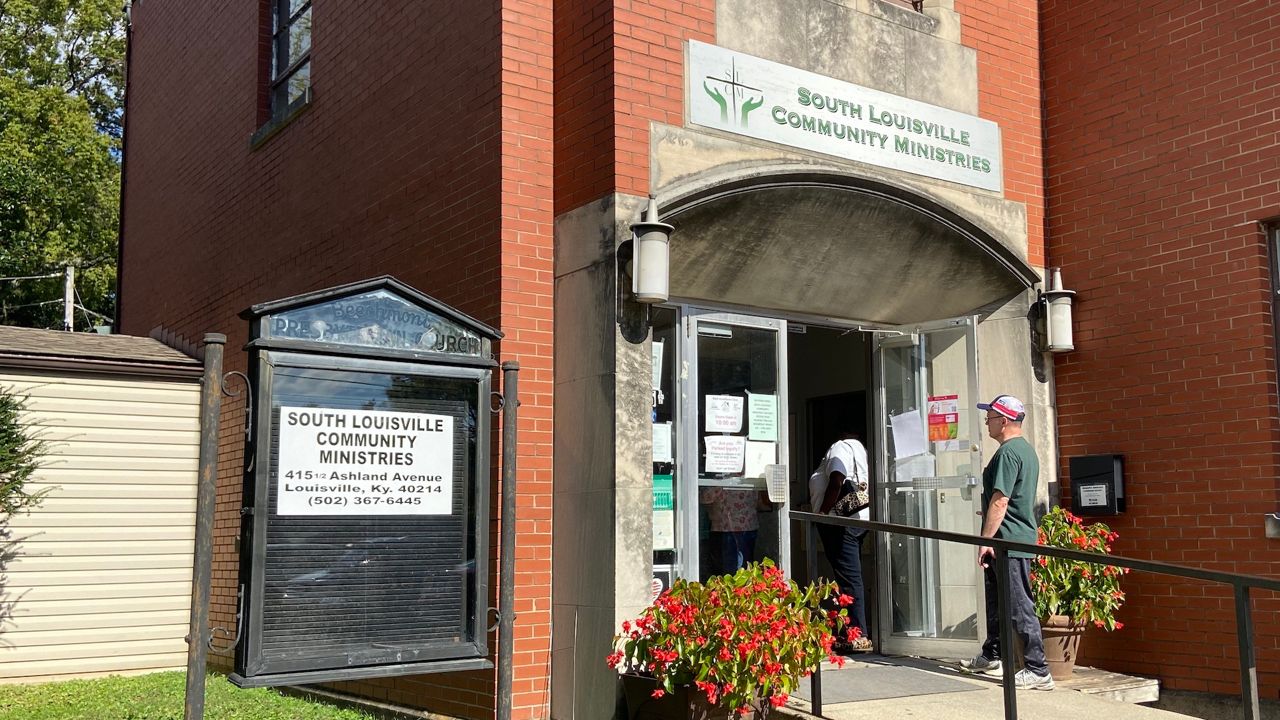LOUISVILLE, Ky. — Mary Perales sat on a bench outside of South Louisville Community Ministries last Thursday with several pressing needs, including a lighter, a ride to her apartment half of a mile away, and $1,000.
“My landlord called me this morning and said he was going to evict me if I don’t pay $1,000,” Perales said. “I don’t have 33 cents.”
Gesturing to the red brick building in front of her, Perales said, “They’re supposed to help.”
Roughly halfway through SLCM’s weekly four-hour rent assistance clinic, a steady stream of clients entered and exited through the small, crowded lobby. Many gripped papers tight. Some carried a young child. They arrived on foot, by taxi, and in cars that quickly filled its tiny parking lot.
“Today is a little extra crazy,” said Jennifer Mansfield, who helps tenants process their claims.
The scene is familiar each Thursday on West Ashland Avenue. SLCM, which runs StopMyEviction.org, regularly assists Louisvillians who are at risk of losing their housing. The Thursday clinics have become a lifeline for thousands of people living on the brink. And soon, they’re coming to an end.
As applications pile up, the last Thursday in October will mark the last SLCM clinic. “We are going to be at 1,000 applications and we don’t want to get to a place where we can no longer serve the people who are coming,” said Clare Rutz Wallace, the executive director of SLCM. “We’re able to tell every single person that we can help them as much as we can. If you fill out an application, you will get assistance. That’s really important for people to feel calm.”
Over the course of the pandemic, SLCM has served six to seven thousand renters. After the U.S. Supreme Court ended the CDC’s eviction moratorium in late August, the number ballooned.
“The capacity isn’t increasing, but the need is,” Wallace said. “So what took six to eight weeks before is now taking eight to 10.”
That means fewer landlords who are willing to wait for the checks to arrive, fewer tenets who are staying in their homes, and more need for assistance.
“We’re at the catastrophe point for a lot of these families,” Wallace said.
Those families come to SLCM, which has a contract with the city, for help connecting with the relief funds. It’s a process that requires completing tedious, often complicated paperwork. But often, the paperwork is the least of the complexities.
Mansfield said she saw a woman Thursday morning who she considers one of her “success stories.” After visiting the clinic earlier in the summer, her landlord was paid, and crisis, at least for the moment, appeared to have been averted. “But then the property manager changed,” Mansfield said, “and the new property manager is refusing to credit the money that was just paid last month.”
Similar complications and questions abound. In the span of 15 minutes Thursday, coordinators asked Wallace for help on a half dozen issues that, despite working on these applications for months, they struggled to answer themselves.
A friend signed a lease for someone because they were formerly homeless with evictions on their record. Can they receive rental assistance without their name on the lease? Maybe.
Can a full-time student with visa status apply for assistance? Yes.
Is rent assistance available for dormitory payments? “Yeah,” Wallace said, “but it might be complicated with the paperwork.”
Things weren’t always this frantic at SLCM. Pre-pandemic, the nonprofit helped people who were going through what Wallace called a “short-term crisis.” Maybe they lose their job, or their car gave out, or they had a new baby. In most cases, it took a month for people to get back on track with SLCM's assistance.
“The pandemic is different,” Wallace said. “Everything happened all at once and for a very long time. You used all your savings. You used all your favors from friends and family. You lost your car because it was repossessed. You’re losing your home, and you’re trying to move bills around because you still have to eat.”
These problems are creating a long-term need, Wallace said, which is why SLCM and other local organizations are pushing for bigger changes. They’re calling on the Metro government to use American Rescue Plan dollars to expand the locations where tenants can seek assistance and permanently expand the number of people providing it.
“We have to stop building these six-month iterations and think about what the next three years should look like,” she said. “So we’re tearing down the shed that we built with two-by-fours and duct tape and saying now it is time to build a house.”



